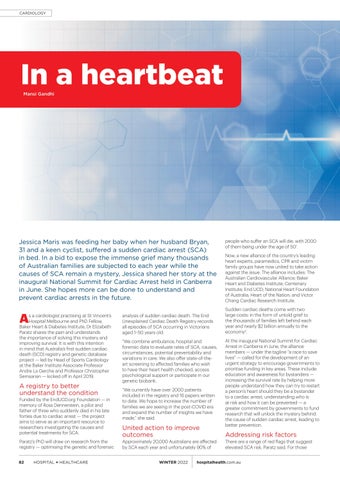CARDIOLOGY
In a heartbeat Mansi Gandhi
Jessica Maris was feeding her baby when her husband Bryan, 31 and a keen cyclist, suffered a sudden cardiac arrest (SCA) in bed. In a bid to expose the immense grief many thousands of Australian families are subjected to each year while the causes of SCA remain a mystery, Jessica shared her story at the inaugural National Summit for Cardiac Arrest held in Canberra in June. She hopes more can be done to understand and prevent cardiac arrests in the future.
A
s a cardiologist practising at St Vincent’s Hospital Melbourne and PhD Fellow, Baker Heart & Diabetes Institute, Dr Elizabeth Paratz shares the pain and understands the importance of solving this mystery and improving survival. It is with this intention in mind that Australia’s first sudden cardiac death (SCD) registry and genetic database project — led by Head of Sports Cardiology at the Baker Institute Associate Professor Andre La Gerche and Professor Christopher Semsarian — kicked off in April 2019.
A registry to better understand the condition
Funded by the EndUCD.org Foundation — in memory of Ross Dennerstein, a pilot and father of three who suddenly died in his late forties due to cardiac arrest — the project aims to serve as an important resource to researchers investigating the causes and potential treatments for SCA. Paratz’s PhD will draw on research from the registry — optimising the genetic and forensic 82
HOSPITAL + HEALTHCARE
analysis of sudden cardiac death. The End Unexplained Cardiac Death Registry records all episodes of SCA occurring in Victorians aged 1–50 years old. “We combine ambulance, hospital and forensic data to evaluate rates of SCA, causes, circumstances, potential preventability and variations in care. We also offer state-of-theart screening to affected families who wish to have their heart health checked, access psychological support or participate in our genetic biobank. “We currently have over 2000 patients included in the registry and 16 papers written to date. We hope to increase the number of families we are seeing in the post-COVID era and expand the number of insights we have made,” she said.
United action to improve outcomes
Approximately 20,000 Australians are affected by SCA each year and unfortunately 90% of WINTER 2022
people who suffer an SCA will die, with 2000 of them being under the age of 501. Now, a new alliance of the country’s leading heart experts, paramedics, CPR and victim family groups have now united to take action against the issue. The alliance includes: The Australian Cardiovascular Alliance; Baker Heart and Diabetes Institute; Centenary Institute; End UCD; National Heart Foundation of Australia; Heart of the Nation; and Victor Chang Cardiac Research Institute. Sudden cardiac deaths come with two large costs: in the form of untold grief to the thousands of families left behind each year and nearly $2 billion annually to the economy2. At the inaugural National Summit for Cardiac Arrest in Canberra in June, the alliance members — under the tagline “a race to save lives” — called for the development of an urgent strategy to encourage governments to prioritise funding in key areas. These include: education and awareness for bystanders — increasing the survival rate by helping more people understand how they can try to restart a person’s heart should they be a bystander to a cardiac arrest; understanding who is at risk and how it can be prevented — a greater commitment by governments to fund research that will unlock the mystery behind the cause of sudden cardiac arrest, leading to better prevention.
Addressing risk factors
There are a range of red flags that suggest elevated SCA risk, Paratz said. For those
hospitalhealth.com.au
